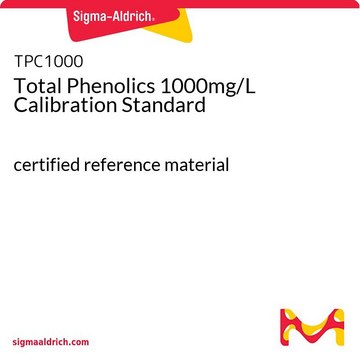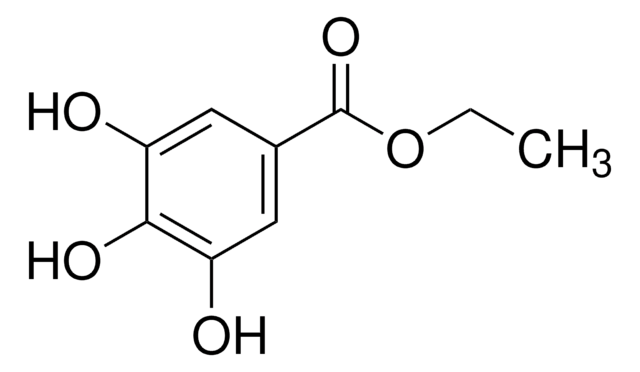48688
Phenol solution
certified reference material, 500 μg/mL in methanol
About This Item
Recommended Products
grade
certified reference material
TraceCERT®
Quality Level
Agency
EPA TO-8
NIOSH 2001
OSHA 32
product line
TraceCERT®
CofA
current certificate can be downloaded
feature
standard type calibration
packaging
ampule of 1 mL
concentration
500 μg/mL in methanol
technique(s)
HPLC: suitable
gas chromatography (GC): suitable
application(s)
cleaning products
cosmetics
environmental
food and beverages
personal care
format
single component solution
storage temp.
2-30°C
SMILES string
Oc1ccccc1
InChI
1S/C6H6O/c7-6-4-2-1-3-5-6/h1-5,7H
InChI key
ISWSIDIOOBJBQZ-UHFFFAOYSA-N
Gene Information
human ... GABRA1(2554)
Looking for similar products? Visit Product Comparison Guide
General description
Application
Other Notes
Legal Information
Not finding the right product?
Try our Product Selector Tool.
Signal Word
Danger
Hazard Statements
Precautionary Statements
Hazard Classifications
Acute Tox. 3 Dermal - Acute Tox. 3 Inhalation - Acute Tox. 3 Oral - Flam. Liq. 2 - STOT SE 1
Target Organs
Eyes,Central nervous system
Storage Class Code
3 - Flammable liquids
WGK
WGK 2
Flash Point(F)
49.5 °F - closed cup
Flash Point(C)
9.7 °C - closed cup
Certificates of Analysis (COA)
Search for Certificates of Analysis (COA) by entering the products Lot/Batch Number. Lot and Batch Numbers can be found on a product’s label following the words ‘Lot’ or ‘Batch’.
Already Own This Product?
Find documentation for the products that you have recently purchased in the Document Library.
Customers Also Viewed
Articles
Separation of 2-Chlorophenol; 2,4-Dichlorophenol; 2,4,6-Tribromophenol; 2,4,6-Trichlorophenol; 2,4-Dinitrophenol; Pentafluorophenol; 2-Methylphenol, analytical standard; 2,3,4,6-Tetrachlorophenol; Pentachlorophenol; 4-Nitrophenol; 2-Bromophenol; 2,3,5,6-Tetrachlorophenol; 2,3,5-Trichlorophenol; 4-Chloro-3-methylphenol; 2,4,5-Trichlorophenol; 4-Methylphenol, analytical standard; 2,4-Dimethylphenol; 2-Nitrophenol; 3-Methylphenol, analytical standard; Phenol; 2-Methyl-4,6-dinitrophenol; 2,3,4-Trichlorophenol; 2,6-Dichlorophenol; 2,3,4,5-Tetrachlorophenol
Protocols
Separation of 2-Nitrophenol; Pentachlorophenol; 2-Bromophenol; Phenol; 4-Nitrophenol; 3-Methylphenol, analytical standard; 4-Chloro-3-methylphenol; 2,4-Dichlorophenol; 2,3,4,6-Tetrachlorophenol; 2-Methylphenol, analytical standard; 2,4,6-Trichlorophenol; 2,4-Dimethylphenol; 2-Chlorophenol
HPLC Analysis of Cresols and Phenol on Astec® CYCLOBOND® I 2000
Protocol for HPLC Analysis of Phenols on SUPELCOSIL™ LC-8
Our team of scientists has experience in all areas of research including Life Science, Material Science, Chemical Synthesis, Chromatography, Analytical and many others.
Contact Technical Service





